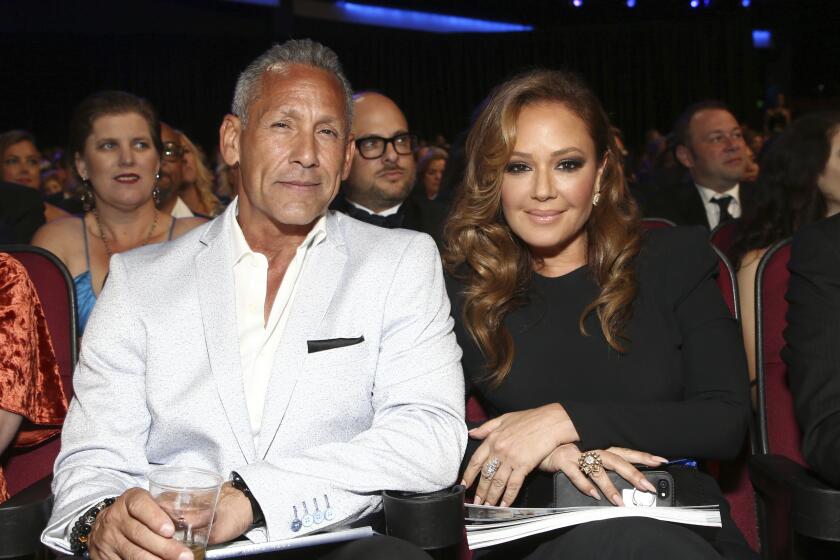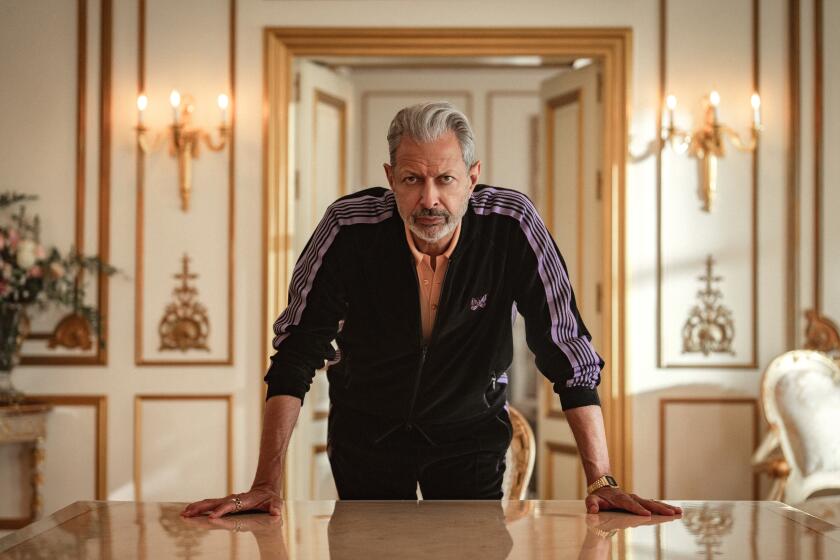The ‘Shadow’ Mystery: Why Remake It?
There’s an adage in television: If it ain’t broke, fix it.
Alfred Hitchcock’s suspenseful 1943 movie “Shadow of a Doubt” certainly ain’t broke. So on Sunday, CBS tries fixing it, airing its own new “Hallmark Hall of Fame” version of a film that Hitchcock said was one of his personal favorites (at 9 p.m. on Channels 2 and 8).
CBS has released a promotional tape on which executive producer Norman Rosemont, director Karen Arthur and members of the new cast effusively praise Hitchcock and the original version. Uh . . . then why remake it?
At exactly what point does someone who greatly admires a piece of art by a master decide he wants to redo it? Hey, what a swell Sistine Chapel! I think I’ll paint one.
It’s not that the new “Shadow of a Doubt,” starring Mark Harmon and Margaret Welsh, is bad viewing. On the contrary, there are far worse ways to spend two hours than watching this latest rendition of a story about a small-town California girl’s gradual realization that the charming uncle she worships is a murderer of wealthy widows.
It’s only that the original with Joseph Cotten and Teresa Wright is so much better.
In fact, if you want to have some fun, watch the CBS “Shadow of a Doubt” Sunday, then rent the cassette of Hitchcock’s version and compare the two. It’s very instructive.
Along with debilitating sequel-itus and spinoff-itus, Hollywood has long been stricken with raging remake-itus. And on May 5, ABC is set to deliver a new version of Charles Laughton’s grandly evil “Night of the Hunter,” with Richard Chamberlain trying to come up to villainous snuff as the menacing religious fanatic whom Robert Mitchum played so memorably in the 1955 movie. Lots of luck.
Hitchcock also remade Hitchcock--witness his two versions of “The Man Who Knew Too Much” separated by 22 years. And Rosemont himself is a prolific remaker, having reforged numerous adventure classics for TV--some of them such as “The Count of Monte-Cristo” and “The Man in the Iron Mask” very credible--plus a fine redoing of “Witness for the Prosecution.”
The “A” list of TV remakes of good movies also includes “A Christmas Carol” with George C. Scott as Scrooge and, most definitely, the great CBS series “MASH.”
Unfortunately, the “Z” list is much longer and includes two series versions of “Casablanca” plus movie versions of “Letter to Three Wives,” “Indiscreet,” “Stagecoach,” “The Sun Also Rises,” “Old Man and the Sea” and “The Defiant Ones.” Well, you could see someone getting ideas about “The Sun Also Rises,” which didn’t do much for Spain or Hemingway as a theatrical film. However, the subsequent two-parter on TV was obscenely bad.
And what about “The Defiant Ones”? What could have been the rationale for the 1986 TV version? Tony Curtis and Sidney Poitier weren’t good enough, so let’s move it up a notch with Robert Urich and Carl Weathers?
The nightmarish possibilities for damage are infinite: Robert De Niro took a good punch in “Raging Bull,” but let’s do it in color with Tony Danza. And so on and so on.
Actually, TV’s “Shadow of a Doubt” is the movie’s second remake, the first being a theatrical cheapie in 1958 with a new title, “Step Down to Terror.”
On Sunday, “Shadow of a Doubt” steps down.
This is the type of story--ordinary people swept up in extraordinary circumstances--that so often attracted Hitchcock. When urbane, handsome, seemingly rich and successful Uncle Charlie (Harmon) unexpectedly pops in on his prim hometown bearing gifts of expensive jewelry and furs, he’s welcomed euphorically by his teen-aged niece/namesake Charlie (Welsh) and her mother, Emma (Diane Ladd). But hot on his trail are two out-of-town cops who suspect him of being an infamous Merry Widow slayer. One of the detectives (Norm Skaggs) gets the hots for young Charlie.
The crux is not the mystery--we’re almost immediately tipped that Uncle Charlie is indeed the rat--but the shifting, intricate relationship between him and his adoring niece, as a series of events persuades her of his guilt, and he knows she knows. The suspense comes in her response to this shattering revelation and his panicky response to her response.
The only version of this “Shadow of a Doubt” that CBS made available for review lacked some music that will be in the broadcast Sunday. This surely accounts for some of the inertia in the preview copy. Even with all of its music, however, there is just no way the new movie can match the tension and tautness of the original, which, though no masterpiece, was very, very good.
John Gay’s teleplay closely tracks the original script by Thornton Wilder, Sally Benson and Alma Reville, its only major differences being an expanded opening and a swollen ending. The new version’s failings lie elsewhere, in the color (which softens the shadowy foreboding of the earlier black-and-white version), the directing and the casting.
Welsh has the feistiness and determination of Wright, but not the vulnerability. She seems almost too lusty. Harmon can glower menacingly (having already proved his psychopathic mettle as serial killer Ted Bundy), but never matches Cotten’s complexity.
For example: A crucial scene--in which Uncle Charlie reveals during a family dinner his dark cynicism and utter contempt for women that hold the keys to his criminal insanity--falls flat Sunday. With Cotten’s arrogant Uncle Charlie unleashing all of that suppressed aggression, Hitchcock made the scene explode.
Whereas Arthur brings a straight face to “Shadow of a Doubt,” moreover, Hitchcock typically folded in humor. One hilarious scene in the original has the guileless Emma baking a cake for the two cops who have told her they’re journalists doing a story on a typical family. And contrasting with the CBS version, Hitchcock constantly poked ironic fun at Emma’s husband and his corny best friend, both amateur crime buffs who passed the time thinking up plots to murder each other while a real murderer, Uncle Charlie, sat in their midst. These characters show up Sunday minus the charm.
Just as various actors approach “Hamlet” differently, filmmakers can have separate visions for the same material. Apparently the only separate vision for Sunday’s “Shadow of a Doubt,” however, is that it should be done in color instead of black and white. That’s not fixing it, that’s breaking it.
The complete guide to home viewing
Get Screen Gab for everything about the TV shows and streaming movies everyone’s talking about.
You may occasionally receive promotional content from the Los Angeles Times.



